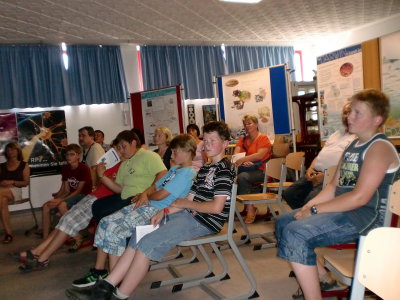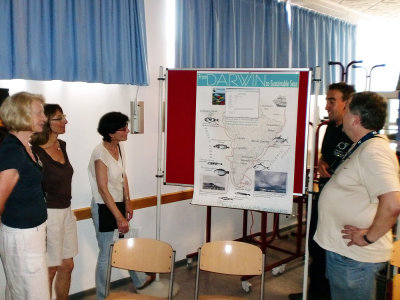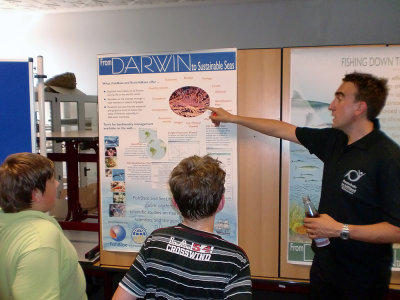There are no translations available.
Rooted in the Upper Palatinate, but also cosmopolitan
Nothing would have fit Marc Einsporn better than the new motto of his former junior high school for boys in Upper Palatinate, Germany.
 This new motto echoed as far as Thailand, from where Marc Einsporn (former pupil and now the Chairman of the Working Group for Study and Teaching of the “German Society for Marine Research” - Deutsche Gesellschaft für Meeresforschung, DGM) responded with a postcard. Welcoming the news from afar has built a collaboration with specialist-tutor for chemistry / biology, Ingrid Franke.
This new motto echoed as far as Thailand, from where Marc Einsporn (former pupil and now the Chairman of the Working Group for Study and Teaching of the “German Society for Marine Research” - Deutsche Gesellschaft für Meeresforschung, DGM) responded with a postcard. Welcoming the news from afar has built a collaboration with specialist-tutor for chemistry / biology, Ingrid Franke.
They hatched the idea for presentations from the underwater world for the two-day celebrations of the 60th anniversary and the renaming of the school (now junior high school in Upper Palatinate - Realschule im Stiftland). "You have to show the students some other perspectives," said Ms. Ingrid Franke. Not only the teachers but also the other 50 or so listeners, would sit to maximum attention throughout the lectures.
 Among others, the question was clarified of how to become a marine researcher from being a bathing surveillor in the swimming pool, but the participants also heard "of dolphins, reindeer and manta rays.
Among others, the question was clarified of how to become a marine researcher from being a bathing surveillor in the swimming pool, but the participants also heard "of dolphins, reindeer and manta rays.
For all of these stories, Marc offered fascinating and impressive images.
There was plenty of room for discussions involving young and old, not only mingled with the presentation, but also all around the poster exhibit of mundusmaris.org "From Darwin to Sustainable Seas".
This exhibition was created by the international Mundus Maris Initiative first shown during the Bicentenary celebration of Latin American independences. The exhibition is intended to produce connections between different dimensions of time, space and people: between yesterday and today, between Latin America and Europe, between science and art, between young and old. The pioneering work of Charles Darwin was right at the centre of the exhibit, as it continues to teach us so much.
The posters also showed what sciences has learnt since Darwin's monumental work and that Darwin's precocious fears of a possible over-exploitation of the sea is exceeded by today's reality.
The exhibit continues with artistic responses of pupils from Europe to the current fisheries crisis. It ends with the poem by Pablo Neruda 'Ode to Hope'. Thus, this cycle is to be concluded positively expressing the hope that the crisis of our time will be overcome - by International Cooperation around the sea, the origin of life.
 In this spirit, Marc did not only want to transmit some of his enthusiasm and interest for the sea, but also create a connection to a constructive attitude to the world and 6.7 billion fellow humans.
In this spirit, Marc did not only want to transmit some of his enthusiasm and interest for the sea, but also create a connection to a constructive attitude to the world and 6.7 billion fellow humans.
Just as important to him was, therefore, the call: "Take your life into your own hands and pursue your dream." And "no matter where you are, do not forget or deny your home. True to the motto: The roots in Upper Palatinate - open to the world!" And why not on the trail of science and the arts?
4 August 2010
Ines Einsporn








